新标准大学英语4 B4U7教案
新目标大学英语第四册教案
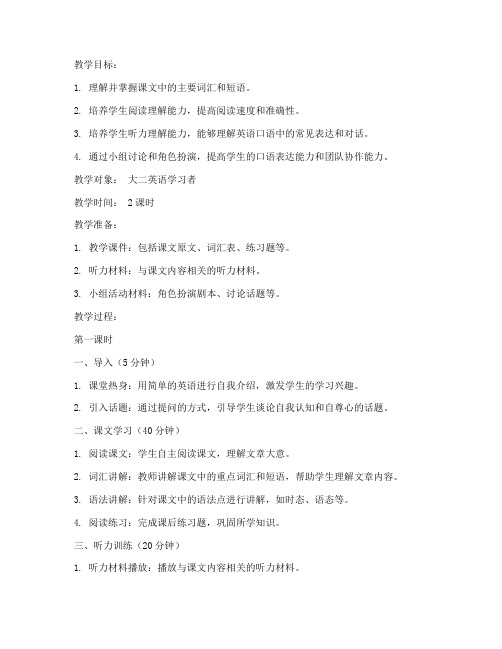
教学目标:1. 理解并掌握课文中的主要词汇和短语。
2. 培养学生阅读理解能力,提高阅读速度和准确性。
3. 培养学生听力理解能力,能够理解英语口语中的常见表达和对话。
4. 通过小组讨论和角色扮演,提高学生的口语表达能力和团队协作能力。
教学对象:大二英语学习者教学时间: 2课时教学准备:1. 教学课件:包括课文原文、词汇表、练习题等。
2. 听力材料:与课文内容相关的听力材料。
3. 小组活动材料:角色扮演剧本、讨论话题等。
教学过程:第一课时一、导入(5分钟)1. 课堂热身:用简单的英语进行自我介绍,激发学生的学习兴趣。
2. 引入话题:通过提问的方式,引导学生谈论自我认知和自尊心的话题。
二、课文学习(40分钟)1. 阅读课文:学生自主阅读课文,理解文章大意。
2. 词汇讲解:教师讲解课文中的重点词汇和短语,帮助学生理解文章内容。
3. 语法讲解:针对课文中的语法点进行讲解,如时态、语态等。
4. 阅读练习:完成课后练习题,巩固所学知识。
三、听力训练(20分钟)1. 听力材料播放:播放与课文内容相关的听力材料。
2. 听力理解:学生听后回答问题,教师进行讲解和点评。
四、小组活动(15分钟)1. 角色扮演:学生分组,根据课文内容进行角色扮演。
2. 小组讨论:围绕课文中的话题进行讨论,如自尊心的重要性、如何建立自尊心等。
第二课时一、复习(10分钟)1. 复习上节课学过的词汇和短语。
2. 回答上节课的听力问题。
二、深入阅读(30分钟)1. 阅读课文第二部分,理解文章细节。
2. 针对课文内容进行讨论,如文章中的观点、论证方法等。
三、口语练习(20分钟)1. 小组讨论:针对课文中的话题进行深入讨论。
2. 角色扮演:学生分组,根据课文内容进行角色扮演。
四、总结与作业布置(10分钟)1. 总结本节课的学习内容。
2. 布置课后作业:复习课文,完成课后练习题。
教学反思:本节课通过课文学习、听力训练、小组活动和口语练习等多种教学手段,帮助学生提高阅读理解能力和听力理解能力,同时培养学生的口语表达能力和团队协作能力。
大学英语四_教材教案
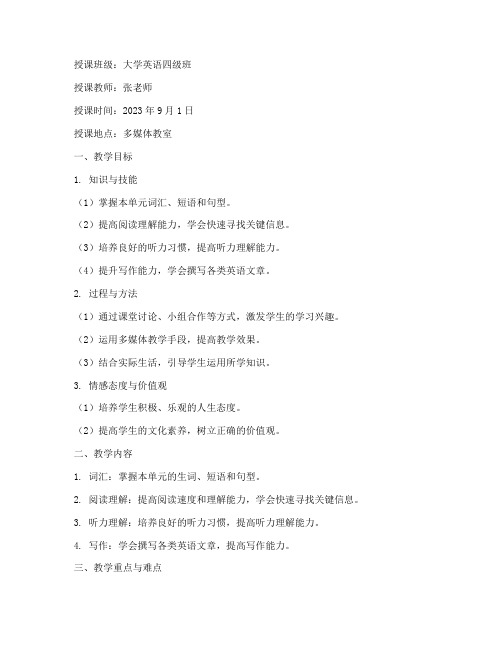
授课班级:大学英语四级班授课教师:张老师授课时间:2023年9月1日授课地点:多媒体教室一、教学目标1. 知识与技能(1)掌握本单元词汇、短语和句型。
(2)提高阅读理解能力,学会快速寻找关键信息。
(3)培养良好的听力习惯,提高听力理解能力。
(4)提升写作能力,学会撰写各类英语文章。
2. 过程与方法(1)通过课堂讨论、小组合作等方式,激发学生的学习兴趣。
(2)运用多媒体教学手段,提高教学效果。
(3)结合实际生活,引导学生运用所学知识。
3. 情感态度与价值观(1)培养学生积极、乐观的人生态度。
(2)提高学生的文化素养,树立正确的价值观。
二、教学内容1. 词汇:掌握本单元的生词、短语和句型。
2. 阅读理解:提高阅读速度和理解能力,学会快速寻找关键信息。
3. 听力理解:培养良好的听力习惯,提高听力理解能力。
4. 写作:学会撰写各类英语文章,提高写作能力。
三、教学重点与难点(1)掌握本单元的词汇、短语和句型。
(2)提高阅读理解能力。
(3)提升听力理解能力。
(4)学会撰写各类英语文章。
2. 教学难点(1)词汇的记忆和应用。
(2)阅读理解中的逻辑推理和细节把握。
(3)听力中的语音、语调和语速的辨识。
(4)写作中的结构安排和语言表达。
四、教学过程1. 导入新课(1)回顾上节课内容,引导学生复习旧知识。
(2)介绍本节课的学习目标。
2. 词汇教学(1)讲解本单元的生词、短语和句型。
(2)通过例句、游戏等方式,帮助学生记忆和运用所学词汇。
3. 阅读理解(1)讲解阅读理解的方法和技巧。
(2)让学生进行阅读练习,教师点评并指导。
4. 听力理解(1)播放听力材料,让学生进行听力练习。
(2)讲解听力技巧,帮助学生提高听力理解能力。
(1)讲解各类英语文章的写作方法和结构。
(2)让学生进行写作练习,教师点评并指导。
6. 总结与作业(1)对本节课的内容进行总结。
(2)布置课后作业,巩固所学知识。
五、教学评价1. 课堂表现:观察学生在课堂上的学习态度、参与度和合作精神。
大学英语第四册七单元教案
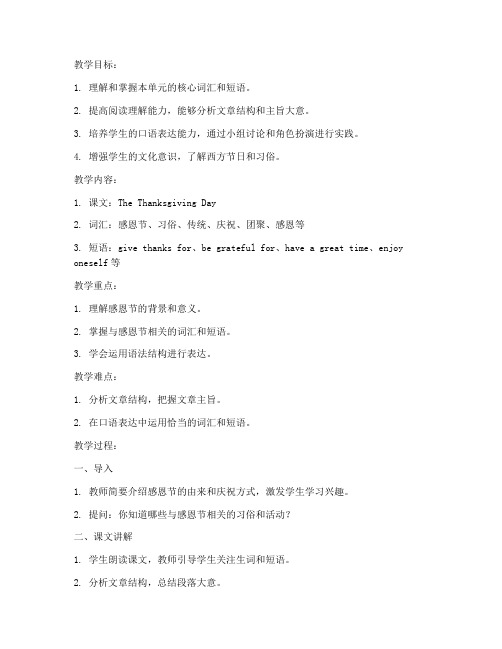
教学目标:1. 理解和掌握本单元的核心词汇和短语。
2. 提高阅读理解能力,能够分析文章结构和主旨大意。
3. 培养学生的口语表达能力,通过小组讨论和角色扮演进行实践。
4. 增强学生的文化意识,了解西方节日和习俗。
教学内容:1. 课文:The Thanksgiving Day2. 词汇:感恩节、习俗、传统、庆祝、团聚、感恩等3. 短语:give thanks for、be grateful for、have a great time、enjoy oneself等教学重点:1. 理解感恩节的背景和意义。
2. 掌握与感恩节相关的词汇和短语。
3. 学会运用语法结构进行表达。
教学难点:1. 分析文章结构,把握文章主旨。
2. 在口语表达中运用恰当的词汇和短语。
教学过程:一、导入1. 教师简要介绍感恩节的由来和庆祝方式,激发学生学习兴趣。
2. 提问:你知道哪些与感恩节相关的习俗和活动?二、课文讲解1. 学生朗读课文,教师引导学生关注生词和短语。
2. 分析文章结构,总结段落大意。
3. 解答学生提出的问题,强调重点词汇和短语。
三、词汇学习1. 教师带领学生回顾本单元的词汇,重点讲解与感恩节相关的词汇和短语。
2. 学生通过造句练习,巩固所学词汇。
四、语法讲解1. 教师讲解与感恩节相关的语法结构,如被动语态、虚拟语气等。
2. 学生进行语法练习,巩固所学语法知识。
五、口语练习1. 小组讨论:如何庆祝感恩节?分享自己的感恩故事。
2. 角色扮演:模拟家庭聚会,练习口语表达。
六、总结与作业1. 教师总结本节课所学内容,强调重点和难点。
2. 布置作业:(1)背诵课文;(2)写一篇关于感恩节的短文;(3)调查自己家庭庆祝感恩节的传统,与同学分享。
教学反思:本节课通过多种教学方法,如讲解、讨论、角色扮演等,帮助学生理解和掌握感恩节的相关知识。
在教学过程中,注重培养学生的阅读理解能力和口语表达能力。
同时,通过小组讨论和角色扮演,让学生在实践中运用所学知识,提高他们的实际应用能力。
新标准大学英语综合教程4课程设计
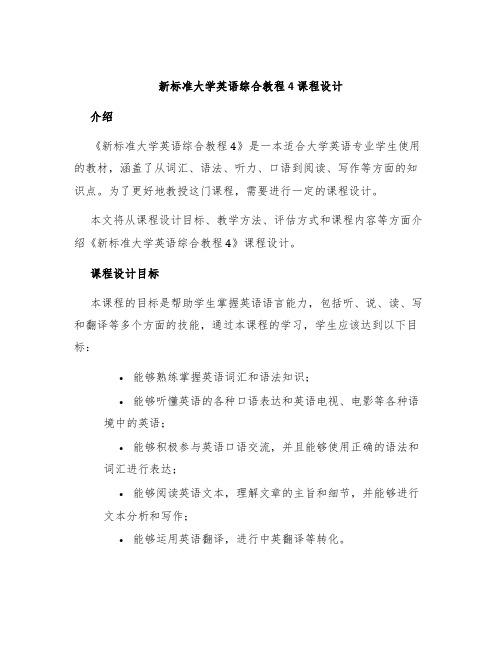
新标准大学英语综合教程4课程设计介绍《新标准大学英语综合教程4》是一本适合大学英语专业学生使用的教材,涵盖了从词汇、语法、听力、口语到阅读、写作等方面的知识点。
为了更好地教授这门课程,需要进行一定的课程设计。
本文将从课程设计目标、教学方法、评估方式和课程内容等方面介绍《新标准大学英语综合教程4》课程设计。
课程设计目标本课程的目标是帮助学生掌握英语语言能力,包括听、说、读、写和翻译等多个方面的技能,通过本课程的学习,学生应该达到以下目标:•能够熟练掌握英语词汇和语法知识;•能够听懂英语的各种口语表达和英语电视、电影等各种语境中的英语;•能够积极参与英语口语交流,并且能够使用正确的语法和词汇进行表达;•能够阅读英语文本,理解文章的主旨和细节,并能够进行文本分析和写作;•能够运用英语翻译,进行中英翻译等转化。
本课程将采用多种教学方法,以提高学生的学习兴趣和效果。
其中包括:情境教学法情境教学法是一种通过创造情境来引导学生学习的方法,以使得学生对所学知识更加深入的理解,并且能够运用到实际生活中。
在本课程中,将通过一些生活中常见的情境模拟,让学生亲身体验英语口语、阅读等各个方面,并能够更好地理解所学知识。
合作学习法合作学习法是一种通过互相协作,互相交流,完成任务的方法,既有利于学生更好地理解所学知识,也有利于培养学生的团队合作精神。
在本课程中,将采用合作学习法,让学生分组进行小组讨论,共同完成英语演讲、英语翻译等任务,从而培养学生的团队协作和沟通能力。
任务驱动教学法任务驱动教学法是一种通过任务让学生直接参与到学习活动中的教学方法,实践性强,能够有效地激发学生对知识的兴趣。
在本课程中,将采用任务驱动教学法,通过针对性的积极参与,完成各种英语任务的方式,来帮助学生更加深入地理解所学知识。
本课程将采用多种方式进行评估,以确定学生学习的效果和能力,其中包括:期中和期末考试期中和期末考试是本课程的一部分,它们将涵盖本课程中的所有知识点和技能,通过考试来验证学生有关英语方面的理解和应用能力。
大学英语精读四unit7电子教案

教学目标:1. 理解课文内容,掌握课文中的重点词汇、短语和句型。
2. 提高学生的阅读理解能力,培养学生的英语思维。
3. 培养学生运用英语进行口头和书面表达的能力。
教学重点:1. 课文内容:理解文章主旨,掌握作者观点和论证过程。
2. 词汇:掌握课文中的重点词汇和短语。
3. 句型:掌握课文中的典型句型,如倒装句、虚拟语气等。
教学难点:1. 理解文章结构,分析作者的论证方法。
2. 理解并运用课文中的复杂句型。
教学准备:1. 教学课件2. 教材3. 课堂练习题教学过程:一、导入1. 教师简要介绍课文背景,激发学生学习兴趣。
2. 提问:What is the main topic of this passage? (课文主题是什么?)二、课文精读1. 学生阅读课文,找出重点词汇和短语。
2. 教师带领学生分析课文结构,讲解作者的论证方法。
3. 学生讨论课文中的难点,教师解答。
三、词汇学习1. 教师带领学生复习课文中的重点词汇和短语,并进行造句练习。
2. 学生根据课文内容,自己总结出一些与课文相关的词汇和短语。
四、句型学习1. 教师讲解课文中的典型句型,如倒装句、虚拟语气等。
2. 学生进行句型转换练习,加深对句型的理解。
五、课堂练习1. 学生完成课堂练习题,巩固所学知识。
2. 教师批改练习题,讲解错误,纠正发音。
六、总结1. 教师总结本节课的学习内容,强调重点和难点。
2. 学生分享学习心得,提出疑问。
七、作业布置1. 复习课文,熟读课文中的重点段落。
2. 完成课后练习题,巩固所学知识。
教学反思:本节课通过精读课文、词汇学习和句型练习,帮助学生提高阅读理解能力和英语思维。
在教学过程中,教师应注重激发学生的学习兴趣,引导学生积极参与课堂活动。
同时,要关注学生的个体差异,因材施教,使每个学生都能在课堂上有所收获。
新标准大学英语综合训练第4册课程设计
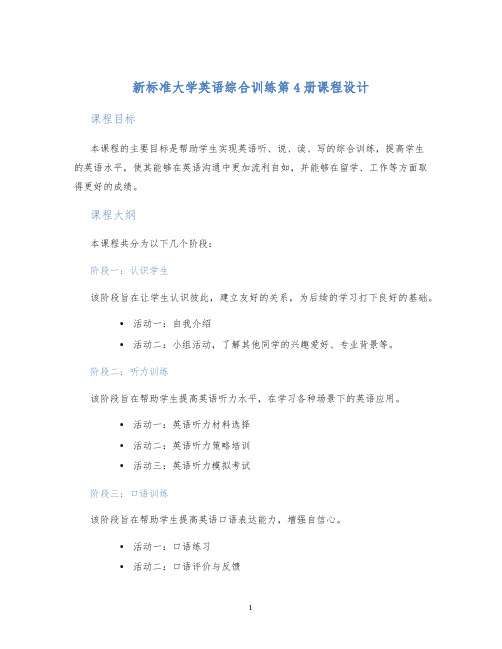
新标准大学英语综合训练第4册课程设计课程目标
本课程的主要目标是帮助学生实现英语听、说、读、写的综合训练,提高学生
的英语水平,使其能够在英语沟通中更加流利自如,并能够在留学、工作等方面取得更好的成绩。
课程大纲
本课程共分为以下几个阶段:
阶段一:认识学生
该阶段旨在让学生认识彼此,建立友好的关系,为后续的学习打下良好的基础。
•活动一:自我介绍
•活动二:小组活动,了解其他同学的兴趣爱好、专业背景等。
阶段二:听力训练
该阶段旨在帮助学生提高英语听力水平,在学习各种场景下的英语应用。
•活动一:英语听力材料选择
•活动二:英语听力策略培训
•活动三:英语听力模拟考试
阶段三:口语训练
该阶段旨在帮助学生提高英语口语表达能力,增强自信心。
•活动一:口语练习
•活动二:口语评价与反馈
1。
新标准大学英语4b4u7教案

Unit 7 No Place Like Home(New Standard English, Book 4)Section 1 Lead-inActivity 1 Home on the RangeDirections: Listen to the song and fill in the blanks with the missing words.Oh, give me a home where the buffalo roamWhere the deer and the antelope playWhere seldom is heard a discouraging wordAnd the skies are not cloudy all dayHome, home on the rangeHow often at night when the heavens are brightI see the light of those flickering starsHave I laid there amazed and asked, as I gazedIf their glory exceeds that of oursActivity 2 Design My Sweet HomeDirections: Watch the video. Work in pairs. Imagine your ideal home and discuss the questions.1 Where in the world would you like to live--I would like a tropical island –Hai’nan would be su itable2 What would it look like from the inside and outside--Outside: a swimming pool , a big balcony , trees and plants, a blue roof.Inside: high ceilings, white tile floors, work room with book shelves and the latest computers,a large kitchen.3 What would you like to see when you look out of the window--On one side the sea with palm trees and on the other my swimming pool with brightly colouredplants.Activity 3 Home AssociationsWhat do you associate with the idea of homeActivity 4 What’s HomeDirections: Fill in the blanks to complete the definition.A roof to keep out the rainFour walls to keep out the windFloors to keep out the coldYes, but home is more than that.It is the laugh of a baby, the song of a mother, the strength of a father,warmth of loving hearts, lights from happy eyes, kindness, loyalty, and comradeship. Home is the first school for young ones,where they learn what is right, what is good and what is kind;where they go for comfort when they are hurt or sick;where joy is shared and sorrow eased;where fathers and mothers are respected and loved, and children are wanted;where the simplest food is good enough for kings because it is earned;where money is not as important as love and kindness;where even the tea kettle sings from happiness.That is home.Section 2 Active Reading Passage 1Golden MemoriesText organizationResidents (Para. 3-15)My feelingsFirst residentsthe goundsman with a young woman More residentsA smart man with his family More residentsTwo middle-aged womenMore residentsA family with a pet dogLast residentsJoseph I was soon filled with the sounds of conversation and laughterIt seemed as if no one spent much time at home any moreI like them because of the care they showed to my rooms and my garden.I have to admit I resented.I liked him, we kept each other company.Information Analysis(P102 Ex. 9)1 ... I do know that strangely, although we're identical, we're the exact opposite of each other ... Why are the house and its neighbour identical yet the exact opposite of each other--The house and its neighbour have the same structure, but they are facing opposite ways,with the front door of the house facing east, while its neighbour’s facing west.2 Soon there were children to look after too ...In what way does the house look after the children--The house provides shelter and keeps them warm and dry.3 I thought they looked rather coarse against my handsome stone.Does the house like the new brick houses being built Why / Why not--No, he doesn’t think brick is as fine a material as stone. The word coarse is negative in connotation.4 But we were all warm and clean, and although it was different, it wasn’t unpleasant.What does the house feel about progress--Fairly positive although a little nervous.5 My floorboards creak, and ghosts make strange noises throughout the night.If the house were a human, what would creaking floorboards and ghosts suggestThe two words suggest old age with stiff muscles and many memories.6 Round the bend comes a large crane with a kind of ball and chain. I do hope it will go away. What do you think the crane is coming to do Do you think it will go awayBalls are used to smash down walls, so it sounds as if the building will be demolished rather than repaired. If so, the crane will not go away.(P102, Ex. 10)1 Would you prefer to live in an old building or a new one, and why-- A new one as it is likely to be more comfortable. I also like living high up, so I can get a good view.I think I prefer old buildings. They have more character, and I think they were better builtin the old days.2 Do you think old houses should be saved and restored, or should they be pulled down and the land used to provide homes for more families-- We don’t want everywhere to look the same. Old buildings make a place more interesting. A town exists in time as well as space.We must be practical. High-rise buildings can house far more people. Old houses waste land.3 To what extent do you think old buildings are part of the local or national heritage, or are they symbols of an unnecessary and sentimental attachment to the past-- I think to try to protect all old buildings just because they are old would be, as the question says, “an unnecessary and sentimental attachment to the past”. But if the buildings are of historical significance, they are part of our heritage. Chinese culture is too old and valuable for us to simply forget the past.Golden MemoriesI can still remember the men who built the house. The master from the manor house found clearing in the huge orchard which ran up and down the hills. I only see my neighbour from the side. I’ve never seen him face on. Apart from the autumn, the groundsman brought a young woman home. I was filled with the sound of conversation and laughter. The woman looked after the garden around me; there was a riot of colours. With time goes by, they had children and then grew up. But one day, I saw a postman arrive with a bundle of letters, the woman cried out and fainted. Years later, they left without saying goodbye to me.Two middle-aged women spent several years here. I like them because they kept everything clean and tidy. The last person lived with me working at assembling furniture. We just kept each other company. He walked very slowly using his hands to steady himself.Time goes by, there are signs of everyone who has lived with me. However, there are my goldenmemories. But in fact, I look and feel my age.1.充满了欢声笑语2.五彩缤纷3.深秋4.穿着漂亮5.一摞信6.中年妇女7.干净整洁8.各式电器9.收破烂的10.挖土刨坑11.组装家具12.互相做伴13.使某人稳住14.喘气15.腐烂的苹果16.拐弯处1. be filled with the sounds of conversation and laughter2. a riot of colours3. late autumn4. dress smartly5. a bundle of letters6. middle-aged women7. clean and tidy8. all sorts of appliance9. rag-and-bone man10. dig up11. assemble furniture12. keep each other company13. steady oneself14. catch one’s breath15. decaying apples16. round the bendSection 3 Active Reading Passage 2Home Thoughts1. 归属感2.西部荒原3.让人惊叹的照片1. sense of belonging2. Wild West3. striking photos4.令人震撼5.提高生活水平6.寿命延长一倍7.意识到自己与众不同8.席卷而去9.收拾家当10.宗教仇恨11.自由者的国土12.勇敢者的家园13.传统大家庭14.核心家庭4. come as a shock5. raise the standards of living6. double lifespan7. consciousness of difference8. sweep away9. pack up10. religious hatred11. land of the free12. home of the brave13. traditional extended family14. nuclear family1. Home is where we hunker down … It’s an inward-looking place, where we should feel safe.(Para 5)家是我们可以放松休息的地方,在家里我们脱下鞋子,忘掉外面那个纷扰的世界。
大学英语精读4unit7电子教案
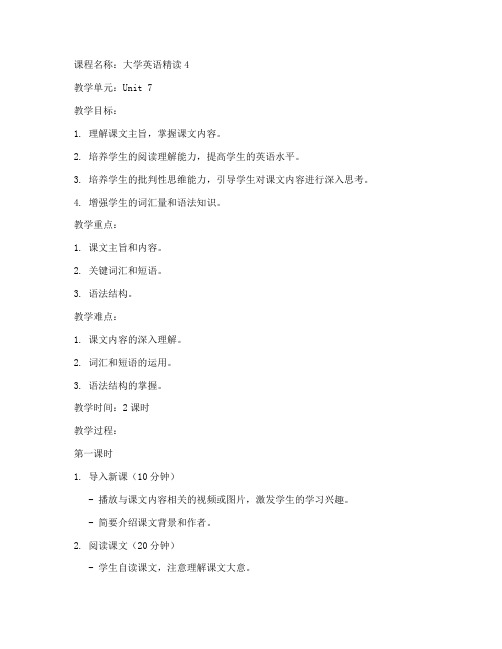
课程名称:大学英语精读4教学单元:Unit 7教学目标:1. 理解课文主旨,掌握课文内容。
2. 培养学生的阅读理解能力,提高学生的英语水平。
3. 培养学生的批判性思维能力,引导学生对课文内容进行深入思考。
4. 增强学生的词汇量和语法知识。
教学重点:1. 课文主旨和内容。
2. 关键词汇和短语。
3. 语法结构。
教学难点:1. 课文内容的深入理解。
2. 词汇和短语的运用。
3. 语法结构的掌握。
教学时间:2课时教学过程:第一课时1. 导入新课(10分钟)- 播放与课文内容相关的视频或图片,激发学生的学习兴趣。
- 简要介绍课文背景和作者。
2. 阅读课文(20分钟)- 学生自读课文,注意理解课文大意。
- 教师提问,检查学生对课文内容的理解。
3. 分析课文(20分钟)- 分析课文结构,总结段落大意。
- 讨论课文中的关键词汇和短语。
- 分析课文中的语法结构。
4. 课堂练习(10分钟)- 进行课文内容填空、翻译等练习。
- 检查学生对课文内容的掌握情况。
第二课时1. 复习上节课内容(10分钟)- 复习课文内容、关键词汇和短语、语法结构。
- 检查学生对上节课内容的掌握情况。
2. 深入讨论(20分钟)- 引导学生就课文内容进行深入讨论,培养学生的批判性思维能力。
- 鼓励学生提出自己的观点和见解。
3. 拓展阅读(10分钟)- 介绍与课文内容相关的背景知识,拓展学生的知识面。
4. 总结与作业布置(10分钟)- 总结本节课的学习内容。
- 布置课后作业,包括课文翻译、词汇练习、语法练习等。
教学评价:1. 课堂表现:观察学生在课堂上的参与程度、回答问题的准确性等。
2. 作业完成情况:检查学生课后作业的质量。
3. 期末考试:评估学生对本单元知识的掌握情况。
教学资源:1. 课文电子版2. 课件3. 词汇表4. 语法练习册教学反思:在教学过程中,教师应关注学生的学习需求,适时调整教学策略,以提高教学效果。
同时,教师应注重培养学生的自主学习能力,引导学生积极参与课堂活动,提高学生的英语综合运用能力。
新标准大学英语4 B4U7教案
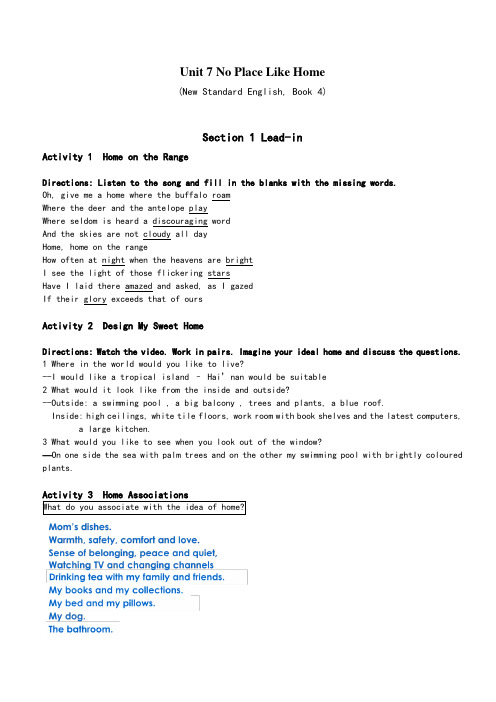
Unit 7 No Place Like Home(New Standard English, Book 4)Section 1 Lead-inActivity 1 Home on the RangeDirections: Listen to the song and fill in the blanks with the missing words.Oh, give me a home where the buffalo roamWhere the deer and the antelope playWhere seldom is heard a discouraging wordAnd the skies are not cloudy all dayHome, home on the rangeHow often at night when the heavens are brightI see the light of those flickering starsHave I laid there amazed and asked, as I gazedIf their glory exceeds that of oursActivity 2 Design My Sweet HomeDirections: Watch the video. Work in pairs. Imagine your ideal home and discuss the questions.1 Where in the world would you like to live?--I would like a tropical island –Hai’nan would be s uitable2 What would it look like from the inside and outside?--Outside: a swimming pool , a big balcony , trees and plants, a blue roof.Inside: high ceilings, white tile floors, work room with book shelves and the latest computers,a large kitchen.3 What would you like to see when you look out of the window?--On one side the sea with palm trees and on the other my swimming pool with brightly coloured plants.What do you associate with the idea of home?Activity 4 What’s Home?Directions: Fill in the blanks to complete the definition.A roof to keep out the rain?Four walls to keep out the wind?Floors to keep out the cold?Yes, but home is more than that.It is the laugh of a baby, the song of a mother, the strength of a father,warmth of loving hearts, lights from happy eyes, kindness, loyalty, and comradeship.Home is the first school for young ones,where they learn what is right, what is good and what is kind;where they go for comfort when they are hurt or sick;where joy is shared and sorrow eased;where fathers and mothers are respected and loved, and children are wanted;where the simplest food is good enough for kings because it is earned;where money is not as important as love and kindness;where even the tea kettle sings from happiness.That is home.Section 2 Active Reading Passage 1Golden MemoriesText organizationResidents (Para. 3-15)My feelingsFirst residents(para.3-8)the goundsman with a young womanMore residents (para.9)A smart man with his familyMore residents (para.10)Two middle-aged womenMore residents (para.12)A family with a pet dogI was soon filled with the sounds of conversation andlaughterIt seemed as if no one spent much time at home any moreI like them because of the care they showed to my roomsand my garden.I have to admit I resented.(P102 Ex. 9)1 (Para.2)... I do know that strangely, although we're identical, we're the exact opposite of each other ...Why are the house and its neighbour identical yet the exact opposite of each other?--The house and its neighbour have the same structure, but they are facing opposite ways, with the front door of the house fac ing east, while its neighbour’s facing west.2 (Para.5) Soon there were children to look after too ...In what way does the house look after the children?--The house provides shelter and keeps them warm and dry.3 (Para.9) I thought they looked rather coarse against my handsome stone.Does the house like the new brick houses being built? Why / Why not?--No, he doesn’t think brick is as fine a material as stone. The word coarse is negative in connotation.4 (Para.10) But we were all warm and clean, and although it was different, it wasn’t unpleasant. What does the house feel about progress?--Fairly positive although a little nervous.5 (Para.14) My floorboards creak, and ghosts make strange noises throughout the night.If the house were a human, what would creaking floorboards and ghosts suggest?The two words suggest old age with stiff muscles and many memories.6 (Para.16) Round the bend comes a large crane with a kind of ball and chain. I do hope it will go away.What do you think the crane is coming to do? Do you think it will go away?Balls are used to smash down walls, so it sounds as if the building will be demolished rather than repaired. If so, the crane will not go away.(P102, Ex. 10)1 Would you prefer to live in an old building or a new one, and why?-- A new one as it is likely to be more comfortable. I also like living high up, so I can get a good view.I think I prefer old buildings. They have more character, and I think they were better builtin the old days.2 Do you think old houses should be saved and restored, or should they be pulled down and theland used to provide homes for more families?-- We don’t want everywhere to look the same. Old buildings make a place more interesting. A town exists in time as well as space.We must be practical. High-rise buildings can house far more people. Old houses waste land.3 To what extent do you think old buildings are part of the local or national heritage, or are they symbols of an unnecessary and sentimental attachment to the past?-- I think to try to protect all old buildings just because they are old would be, as the question says, “an unnecessary and sentimental attachment to the past”. But if the buildings are of historical significance, they are part of our heritage. Chinese culture is too old and valuable for us to simply forget the past.Golden MemoriesI can still remember the men who built the house. The master from the manor house found clearing in the huge orchard which ran up and down the hills. I only see my neighbour from the side. I’ve never seen him face on. Apart from the autumn, the groundsman brought a young woman home. I was filled with the sound of conversation and laughter. The woman looked after the garden around me; there was a riot of colours. With time goes by, they had children and then grew up. But one day, I saw a postman arrive with a bundle of letters, the woman cried out and fainted. Years later, they left without saying goodbye to me.Two middle-aged women spent several years here. I like them because they kept everything clean and tidy. The last person lived with me working at assembling furniture. We just kept each other company. He walked very slowly using his hands to steady himself.Time goes by, there are signs of everyone who has lived with me. However, there are my golden memories. But in fact, I look and feel my age.1.充满了欢声笑语2.五彩缤纷3.深秋4.穿着漂亮5.一摞信6.中年妇女7.干净整洁8.各式电器9.收破烂的10.挖土刨坑11.组装家具12.互相做伴13.使某人稳住14.喘气15.腐烂的苹果1. be filled with the sounds of conversation and laughter2. a riot of colours3. late autumn4. dress smartly5. a bundle of letters6. middle-aged women7. clean and tidy8. all sorts of appliance9. rag-and-bone man10. dig up11. assemble furniture12. keep each other company13. steady oneself14. catch one’s breath15. decaying apples16.拐弯处16. round the bendSection 3 Active Reading Passage 2Home Thoughts1. 归属感2.西部荒原3.让人惊叹的照片4.令人震撼5.提高生活水平6.寿命延长一倍7.意识到自己与众不同8.席卷而去9.收拾家当10.宗教仇恨11.自由者的国土12.勇敢者的家园13.传统大家庭14.核心家庭1. sense of belonging2. Wild West3. striking photos4. come as a shock5. raise the standards of living6. double lifespan7. consciousness of difference8. sweep away9. pack up10. religious hatred11. land of the free12. home of the brave13. traditional extended family14. nuclear family1. Home is where we hunker down … It’s an inward-looking place, where we should feel safe.(Para 5)家是我们可以放松休息的地方,在家里我们脱下鞋子,忘掉外面那个纷扰的世界。
新标准大学英语4 教案64学时
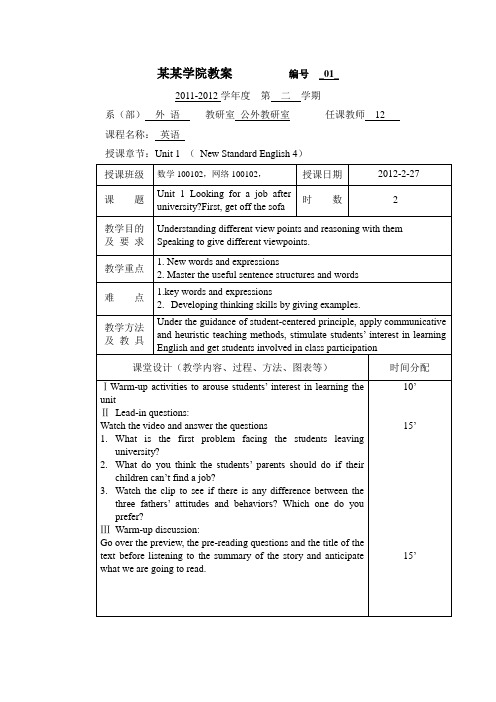
某某学院教案编号_01_2011-2012学年度第二学期系(部)外语教研室公外教研室任课教师12 课程名称:英语授课章节:Unit 1 (New Standard English 4)教研室主任(签字):________________某某学院教案编号_02_2011-2012学年度第二学期系(部)外语教研室公外教研室任课教师12 课程名称:英语授课章节:Unit 1 (New Standard English 4)教研室主任(签字):________________某某学院教案编号_03_2011-2012学年度第二学期系(部)外语教研室公外教研室任课教师12 课程名称:英语授课章节:Unit 1 (New Standard English 4)教研室主任(签字):________________某某学院教案编号_04_2011-2012学年度第二学期系(部)外语教研室公外教研室任课教师12 课程名称:英语授课章节:Unit 1(New Standard English 4 )教研室主任(签字):________________某某学院教案编号_05_2011-2012学年度第二学期系(部)外语教研室公外教研室任课教师12 课程名称:英语授课章节:Unit 2(New Standard English 4)教研室主任(签字):________________某某学院教案编号_06_2011-2012学年度第二学期系(部)外语教研室公外教研室任课教师12 课程名称:英语授课章节:Unit 2 (New Standard English 4)教研室主任(签字):________________某某学院教案编号_07_2011-2012学年度第二学期系(部)外语教研室公外教研室任课教师12 课程名称:英语授课章节:Unit 2 (New Standard English 4)教研室主任(签字):________________某某学院教案编号_08_2011-2012学年度第二学期系(部)外语教研室公外教研室任课教师12 课程名称:英语授课章节:Unit 2(New Standard English 4 )教研室主任(签字):________________某某学院教案编号_09_2011-2012学年度第二学期系(部)外语教研室公外教研室任课教师12 课程名称:英语授课章节:Unit3 (New Standard English 4)教研室主任(签字):________________某某学院教案编号_10_2011-2012学年度第二学期系(部)外语教研室公外教研室任课教师12 课程名称:英语授课章节:Unit 3 (New Standard English 4)教研室主任(签字):________________某某学院教案编号_11_2011-2012学年度第二学期系(部)外语教研室公外教研室任课教师12 课程名称:英语授课章节:Unit3 (New Standard English 4)教研室主任(签字):________________某某学院教案编号_12_2011-2012学年度第二学期系(部)外语教研室公外教研室任课教师12 课程名称:英语授课章节:Unit 4(New Standard English 4 )教研室主任(签字):________________某某学院教案编号_13_2011-2012学年度第二学期系(部)外语教研室公外教研室任课教师12 课程名称:英语授课章节:Unit 4 (New Standard English 4)教研室主任(签字):________________某某学院教案编号_14_2011-2012学年度第二学期系(部)外语教研室公外教研室任课教师12 课程名称:英语授课章节:Unit 4 (New Standard English 4)教研室主任(签字):________________某某学院教案编号_15_2011-2012学年度第二学期系(部)外语教研室公外教研室任课教师12 课程名称:英语授课章节:Unit 4 (New Standard English 4)教研室主任(签字):________________某某学院教案编号_16_2011-2012学年度第二学期系(部)外语教研室公外教研室任课教师12 课程名称:英语授课章节:Unit 4(New Standard English 4 )教研室主任(签字):________________某某学院教案编号_17_2011-2012学年度第二学期系(部)外语教研室公外教研室任课教师12 课程名称:英语授课章节:Unit 5 (New Standard English 4)教研室主任(签字):________________某某学院教案编号_18_2011-2012学年度第二学期系(部)外语教研室公外教研室任课教师12 课程名称:英语授课章节:Unit 5 (New Standard English 4)教研室主任(签字):________________某某学院教案编号_19_2011-2012学年度第二学期系(部)外语教研室公外教研室任课教师12 课程名称:英语授课章节:Unit 5 (New Standard English 4)教研室主任(签字):________________某某学院教案编号_20_2011-2012学年度第二学期系(部)外语教研室公外教研室任课教师12 课程名称:英语授课章节:Unit 5(New Standard English 4 )教研室主任(签字):________________某某学院教案编号_21_2011-2012学年度第二学期系(部)外语教研室公外教研室任课教师12 课程名称:英语授课章节:Unit 6 (New Standard English 4)教研室主任(签字):________________某某学院教案编号_22_2011-2012学年度第二学期系(部)外语教研室公外教研室任课教师12 课程名称:英语授课章节:Unit 6(New Standard English 4)教研室主任(签字):________________某某学院教案编号_23_2011-2012学年度第二学期系(部)外语教研室公外教研室任课教师12 课程名称:英语授课章节:Unit 6 (New Standard English 4)教研室主任(签字):________________某某学院教案编号_24_2011-2012学年度第二学期系(部)外语教研室公外教研室任课教师12 课程名称:英语授课章节:Unit 6(New Standard English 4 )教研室主任(签字):________________某某学院教案编号_25_2011-2012学年度第二学期系(部)外语教研室公外教研室任课教师12 课程名称:英语授课章节:Unit 7 (New Standard English 4)教研室主任(签字):________________。
新标准大学英语4B4U7教案
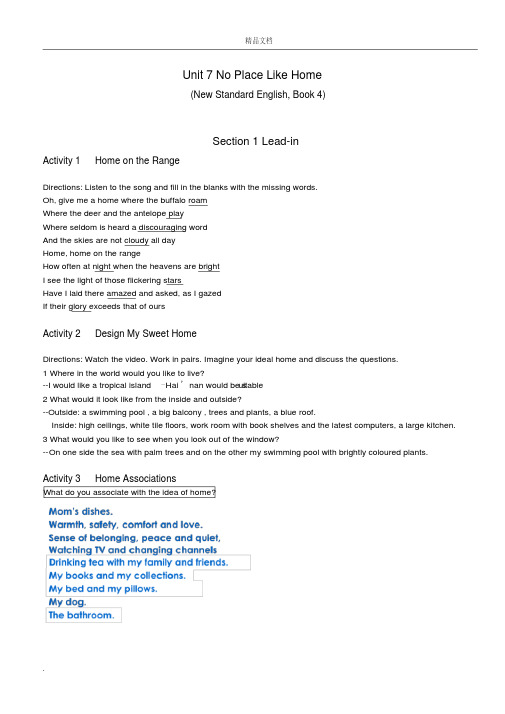
Unit 7 No Place Like Home(New Standard English, Book 4)Section 1 Lead-inActivity 1 Home on the RangeDirections: Listen to the song and fill in the blanks with the missing words.Oh, give me a home where the buffalo roamWhere the deer and the antelope playWhere seldom is heard a discouraging wordAnd the skies are not cloudy all dayHome, home on the rangeHow often at night when the heavens are brightI see the light of those flickering starsHave I laid there amazed and asked, as I gazedIf their glory exceeds that of oursActivity 2 Design My Sweet HomeDirections: Watch the video. Work in pairs. Imagine your ideal home and discuss the questions.1 Where in the world would you like to live?--I would like a tropical island –Hai’nan would be s uitable2 What would it look like from the inside and outside?--Outside: a swimming pool , a big balcony , trees and plants, a blue roof.Inside: high ceilings, white tile floors, work room with book shelves and the latest computers, a large kitchen.3 What would you like to see when you look out of the window?--On one side the sea with palm trees and on the other my swimming pool with brightly coloured plants.Activity 3 Home AssociationsWhat do you associate with the idea of home?Activity 4 What’s Home?Directions: Fill in the blanks to complete the definition.A roof to keep out the rain?Four walls to keep out the wind?Floors to keep out the cold?Yes, but home is more than that.It is the laugh of a baby, the song of a mother, the strength of a father,warmth of loving hearts, lights from happy eyes, kindness, loyalty, and comradeship. Home is the first school for young ones,where they learn what is right, what is good and what is kind;where they go for comfort when they are hurt or sick;where joy is shared and sorrow eased;where fathers and mothers are respected and loved, and children are wanted; where the simplest food is good enough for kings because it is earned;where money is not as important as love and kindness;where even the tea kettle sings from happiness.That is home.Section 2 Active Reading Passage 1Golden MemoriesText organizationResidents (Para. 3-15) My feelingsFirst residents(para.3-8)the goundsman with a young woman More residents (para.9)A smart man with his familyMore residents (para.10)Two middle-aged womenMore residents (para.12)A family with a pet dogLast residents (para.13-15)Joseph I was soon filled with the sounds of conversation and laughterIt seemed as if no one spent much time at home any moreI like them because of the care they showed to my rooms and my garden.I have to admit I resented.I liked him, we kept each other company.Information Analysis(P102 Ex. 9)1 (Para.2)... I do know that strangely, although we're identical, we're the exact opposite of each other ...Why are the house and its neighbour identical yet the exact opposite of each other?--The house and its neighbour have the same structure, but they are facing opposite ways, with the front door of the house facing east, while its neighbour’s facing west.2 (Para.5) Soon there were children to look after too ...In what way does the house look after the children?--The house provides shelter and keeps them warm and dry.3 (Para.9) I thought they looked rather coarse against my handsome stone.Does the house like the new brick houses being built? Why / Why not?--No, he doesn’t think brick is as fine a material as stone. The word coarse is negative in connotation.4 (Para.10) But we were all warm and clean, and although it was different, it wasn’t unpleasant.What does the house feel about progress?--Fairly positive although a little nervous.5 (Para.14) My floorboards creak, and ghosts make strange noises throughout the night.If the house were a human, what would creaking floorboards and ghosts suggest?The two words suggest old age with stiff muscles and many memories.6 (Para.16) Round the bend comes a large crane with a kind of ball and chain. I do hope it will go away.What do you think the crane is coming to do? Do you think it will go away?Balls are used to smash down walls, so it sounds as if the building will be demolished rather than repaired. Ifso, the crane will not go away.Theme Discussion (P102, Ex. 10)1 Would you prefer to live in an old building or a new one, and why?-- A new one as it is likely to be more comfortable. I also like living high up, so I can get a good view.I think I prefer old buildings. They have more character, and I think they were better built in the old days.2 Do you think old houses should be saved and restored, or should they be pulled down and the land used toprovide homes for more families?-- We don’t want everywhere to look the same. Old buildings make a place more interesting. A town exists in time as well as space.We must be practical. High-rise buildings can house far more people. Old houses waste land.3 To what extent do you think old buildings are part of the local or national heritage, or are they symbols ofan unnecessary and sentimental attachment to the past?-- I think to try to protect all old buildings just because they are old would be, as the question says, “anhey are unnecessary and sentimental attachment to the past”. But if the buildings are of historical significance, t part of our heritage. Chinese culture is too old and valuable for us to simply forget the past.SummaryGolden MemoriesI can still remember the men who built the house. The master from the manor house found clearing in thehuge orchard which ran up and down the hills. I only see my neighbour from the side. I’ve never seen himface on.Apart from the autumn, the groundsman brought a young woman home. I was filled with the sound of conversation and laughter. The woman looked after the garden around me; there was a riot of colours. With timegoes by, they had children and then grew up. But one day, I saw a postman arrive with a bundle of letters, thewoman cried out and fainted. Years later, they left without saying goodbye to me.Two middle-aged women spent several years here. I like them because they kept everything clean and tidy.The last person lived with me working at assembling furniture. We just kept each other company. He walked veryslowly using his hands to steady himself.Time goes by, there are signs of everyone who has lived with me. However, there are my golden memories.But in fact, I look and feel my age.Useful Expressions1.充满了欢声笑语2.五彩缤纷3.深秋4.穿着漂亮5.一摞信6.中年妇女7.干净整洁8.各式电器9.收破烂的10.挖土刨坑11.组装家具12.互相做伴13.使某人稳住14.喘气15.腐烂的苹果16.拐弯处1. be filled with the sounds of conversation and laughter2. a riot of colours3. late autumn4. dress smartly5. a bundle of letters6. middle-aged women7. clean and tidy8. all sorts of appliance9. rag-and-bone man10. dig up11. assemble furniture12. keep each other company13. steady oneself14. catch one’s breath15. decaying apples16. round the bendSection 3 Active Reading Passage 2Home ThoughtsUseful Expressions1. 归属感2.西部荒原3.让人惊叹的照片4.令人震撼5.提高生活水平6.寿命延长一倍1. sense of belonging2. Wild West3. striking photos4. come as a shock5. raise the standards of living6. double lifespan7.意识到自己与众不同8.席卷而去9.收拾家当10.宗教仇恨11.自由者的国土12.勇敢者的家园13.传统大家庭14.核心家庭7. consciousness of difference8. sweep away9. pack up10. religious hatred11. land of the free12. home of the brave13. traditional extended family14. nuclear familyDifficult Sentences1. Home is where we hunker down … It’s an inward-looking place, where we should feel safe. (Para 5)家是我们可以放松休息的地方,在家里我们脱下鞋子,忘掉外面那个纷扰的世界。
全新版大学英语四教案
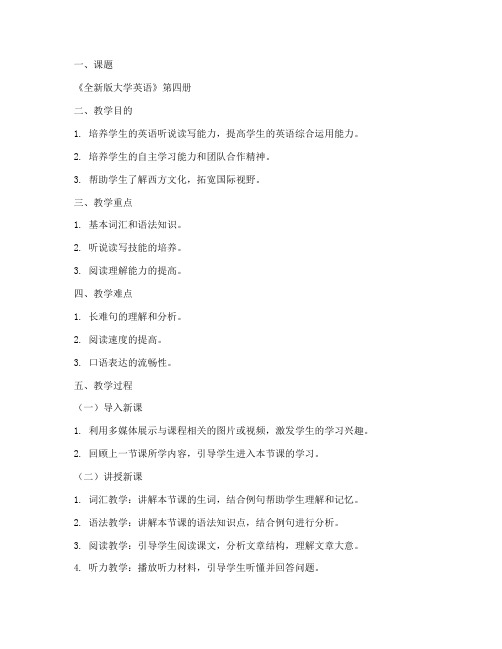
一、课题《全新版大学英语》第四册二、教学目的1. 培养学生的英语听说读写能力,提高学生的英语综合运用能力。
2. 培养学生的自主学习能力和团队合作精神。
3. 帮助学生了解西方文化,拓宽国际视野。
三、教学重点1. 基本词汇和语法知识。
2. 听说读写技能的培养。
3. 阅读理解能力的提高。
四、教学难点1. 长难句的理解和分析。
2. 阅读速度的提高。
3. 口语表达的流畅性。
五、教学过程(一)导入新课1. 利用多媒体展示与课程相关的图片或视频,激发学生的学习兴趣。
2. 回顾上一节课所学内容,引导学生进入本节课的学习。
(二)讲授新课1. 词汇教学:讲解本节课的生词,结合例句帮助学生理解和记忆。
2. 语法教学:讲解本节课的语法知识点,结合例句进行分析。
3. 阅读教学:引导学生阅读课文,分析文章结构,理解文章大意。
4. 听力教学:播放听力材料,引导学生听懂并回答问题。
5. 口语教学:组织学生进行口语练习,提高学生的口语表达能力。
(三)巩固练习1. 词汇练习:让学生完成词汇练习题,巩固所学词汇。
2. 语法练习:让学生完成语法练习题,巩固所学语法知识。
3. 阅读练习:让学生完成阅读理解题,提高阅读速度和理解能力。
4. 听力练习:让学生完成听力练习题,提高听力水平。
5. 口语练习:让学生进行口语对话,提高口语表达能力。
(四)归纳小结1. 总结本节课所学内容,帮助学生巩固知识。
2. 提出课后作业,让学生巩固所学知识。
六、板书设计1. 课题:《全新版大学英语》第四册2. 词汇:本节课的生词列表及例句3. 语法:本节课的语法知识点及例句4. 阅读理解:文章结构、大意及重点句型5. 听力:听力材料及问题6. 口语:口语练习内容七、教具1. 多媒体设备:用于展示图片、视频和听力材料。
2. 课件:用于展示教学内容。
3. 练习题:用于巩固所学知识。
4. 黑板:用于板书教学内容。
八、作业布置1. 完成本节课的课后作业。
2. 预习下一节课的内容。
新版新标准大学英语4教案
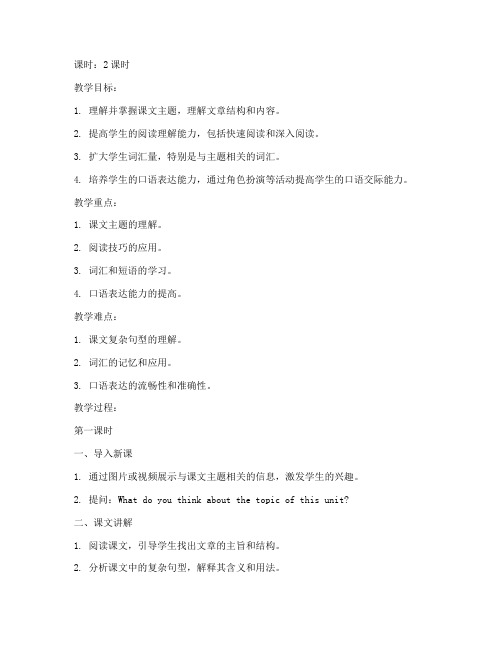
课时:2课时教学目标:1. 理解并掌握课文主题,理解文章结构和内容。
2. 提高学生的阅读理解能力,包括快速阅读和深入阅读。
3. 扩大学生词汇量,特别是与主题相关的词汇。
4. 培养学生的口语表达能力,通过角色扮演等活动提高学生的口语交际能力。
教学重点:1. 课文主题的理解。
2. 阅读技巧的应用。
3. 词汇和短语的学习。
4. 口语表达能力的提高。
教学难点:1. 课文复杂句型的理解。
2. 词汇的记忆和应用。
3. 口语表达的流畅性和准确性。
教学过程:第一课时一、导入新课1. 通过图片或视频展示与课文主题相关的信息,激发学生的兴趣。
2. 提问:What do you think about the topic of this unit?二、课文讲解1. 阅读课文,引导学生找出文章的主旨和结构。
2. 分析课文中的复杂句型,解释其含义和用法。
3. 强调重点词汇和短语,提供例句,帮助学生记忆。
三、词汇学习1. 列出课文中的重点词汇和短语,讲解其含义和用法。
2. 设计词汇练习,如填空、翻译等,巩固学生所学词汇。
四、课堂活动1. 分组讨论:学生分组讨论课文中的某个话题,并准备小组报告。
2. 角色扮演:学生根据课文内容进行角色扮演,提高口语表达能力。
第二课时一、复习导入1. 复习上一节课的内容,检查学生对课文主题、结构和词汇的掌握情况。
2. 回答学生在上节课提出的问题。
二、课堂活动1. 小组报告:各小组展示他们的讨论成果,其他小组进行评价。
2. 角色扮演:学生进行角色扮演,提高口语表达能力。
三、阅读练习1. 设计阅读练习,如填空、判断正误等,检验学生的阅读理解能力。
2. 分析阅读练习中的错误,讲解相关知识点。
四、总结与作业1. 总结本节课的重点内容,强调学生的收获。
2. 布置作业:学生完成课文后的练习题,预习下一节课的内容。
教学反思:本节课通过导入、课文讲解、词汇学习、课堂活动和总结与作业等环节,帮助学生理解课文主题,提高阅读和口语表达能力。
大学英语精读第四册教案u7

课程目标:1. 理解并掌握本单元的关键词汇和短语。
2. 熟悉并分析本单元的语法结构和句型。
3. 提高阅读理解能力,学会从文章中获取信息。
4. 培养学生的批判性思维和语言表达能力。
教学内容:1. Unit 7 课文内容2. 关键词汇和短语3. 语法结构4. 句型练习教学重点:1. 理解课文内容,掌握关键信息。
2. 掌握本单元的语法结构和句型。
3. 提高阅读理解能力。
教学难点:1. 语法结构的理解和运用。
2. 句型练习中的错误纠正。
教学过程:一、导入1. 复习上一单元的内容,引导学生回顾关键词汇和短语。
2. 介绍本单元的课文主题,激发学生的学习兴趣。
二、课文讲解1. 逐段讲解课文内容,帮助学生理解文章大意。
2. 引导学生分析课文中的关键词汇和短语,掌握其含义和用法。
3. 讲解本单元的语法结构和句型,强调其重要性和运用方法。
三、词汇练习1. 针对课文中的关键词汇和短语,进行词义辨析和用法讲解。
2. 学生进行词汇练习,巩固所学知识。
四、语法练习1. 讲解本单元的语法结构和句型,结合课文进行实例分析。
2. 学生进行语法练习,巩固语法知识。
五、阅读理解1. 学生阅读课文,完成阅读理解练习。
2. 教师讲解阅读理解题,帮助学生提高阅读理解能力。
六、总结1. 回顾本单元的学习内容,总结关键知识点。
2. 布置课后作业,巩固所学知识。
七、课后作业1. 复习课文,完成课后练习题。
2. 针对本单元的语法结构和句型,进行相关练习。
3. 阅读相关课外材料,提高英语水平。
教学反思:1. 本节课是否达到了教学目标,学生是否掌握了关键知识点。
2. 教学过程中是否存在难点,如何解决。
3. 学生在课堂上的参与度如何,如何提高学生的积极性。
4. 课后作业的布置是否合理,如何调整。
新大学英语第四册电子教案
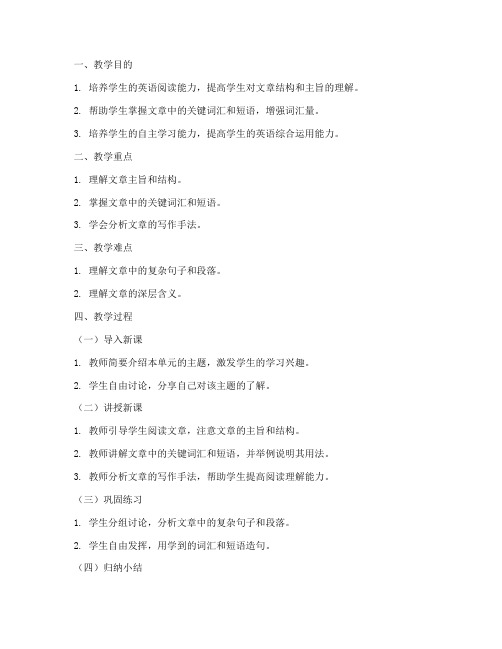
一、教学目的1. 培养学生的英语阅读能力,提高学生对文章结构和主旨的理解。
2. 帮助学生掌握文章中的关键词汇和短语,增强词汇量。
3. 培养学生的自主学习能力,提高学生的英语综合运用能力。
二、教学重点1. 理解文章主旨和结构。
2. 掌握文章中的关键词汇和短语。
3. 学会分析文章的写作手法。
三、教学难点1. 理解文章中的复杂句子和段落。
2. 理解文章的深层含义。
四、教学过程(一)导入新课1. 教师简要介绍本单元的主题,激发学生的学习兴趣。
2. 学生自由讨论,分享自己对该主题的了解。
(二)讲授新课1. 教师引导学生阅读文章,注意文章的主旨和结构。
2. 教师讲解文章中的关键词汇和短语,并举例说明其用法。
3. 教师分析文章的写作手法,帮助学生提高阅读理解能力。
(三)巩固练习1. 学生分组讨论,分析文章中的复杂句子和段落。
2. 学生自由发挥,用学到的词汇和短语造句。
(四)归纳小结1. 教师总结本节课的重点内容,帮助学生巩固所学知识。
2. 学生分享自己的学习心得,提高自主学习能力。
(五)作业布置1. 阅读课文,思考以下问题:a. 文章的主旨是什么?b. 文章的结构是怎样的?c. 文章中有哪些关键词汇和短语?2. 用学到的词汇和短语写一篇短文,内容自选。
五、教具1. 电脑、投影仪2. 课文电子版3. 词汇卡片六、教学时间1. 导入新课:5分钟2. 讲授新课:30分钟3. 巩固练习:15分钟4. 归纳小结:5分钟5. 作业布置:5分钟七、教学反思1. 教师在课堂上应关注学生的参与度,鼓励学生积极发言。
2. 教师要注重培养学生的自主学习能力,提高学生的英语综合运用能力。
3. 教师要及时检查学生的作业,了解学生的学习情况,以便调整教学策略。
新标准大学英语四教案
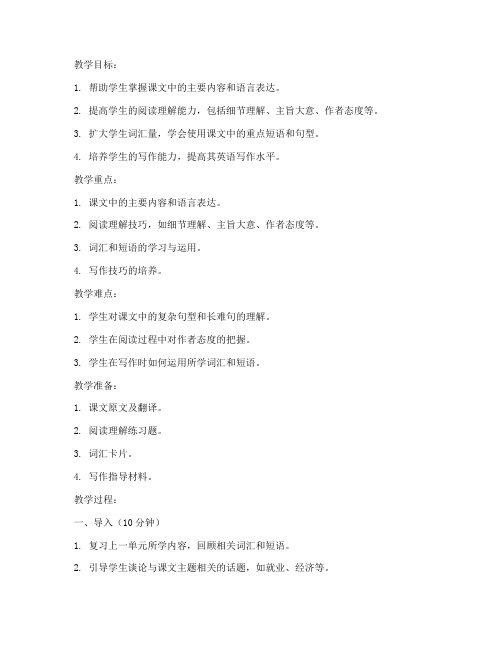
教学目标:1. 帮助学生掌握课文中的主要内容和语言表达。
2. 提高学生的阅读理解能力,包括细节理解、主旨大意、作者态度等。
3. 扩大学生词汇量,学会使用课文中的重点短语和句型。
4. 培养学生的写作能力,提高其英语写作水平。
教学重点:1. 课文中的主要内容和语言表达。
2. 阅读理解技巧,如细节理解、主旨大意、作者态度等。
3. 词汇和短语的学习与运用。
4. 写作技巧的培养。
教学难点:1. 学生对课文中的复杂句型和长难句的理解。
2. 学生在阅读过程中对作者态度的把握。
3. 学生在写作时如何运用所学词汇和短语。
教学准备:1. 课文原文及翻译。
2. 阅读理解练习题。
3. 词汇卡片。
4. 写作指导材料。
教学过程:一、导入(10分钟)1. 复习上一单元所学内容,回顾相关词汇和短语。
2. 引导学生谈论与课文主题相关的话题,如就业、经济等。
二、课文讲解(30分钟)1. 介绍课文背景和作者。
2. 分析课文结构,引导学生找出段落主题句。
3. 解释课文中的重点句型和短语,如:“This is the scenario facing thousands of famil ies.”、“How tough should a parent be to galvanize them in these financially fraught times?”等。
4. 分析作者态度,引导学生理解作者对就业和经济问题的看法。
三、阅读理解(20分钟)1. 分发阅读理解练习题,让学生在规定时间内完成。
2. 指导学生如何分析细节,找出文章主旨大意和作者态度。
3. 针对练习题进行讲解,帮助学生理解正确答案。
四、词汇学习(15分钟)1. 教授课文中的重点词汇,如:revert、nagging、rebel等。
2. 鼓励学生使用这些词汇进行造句,提高词汇运用能力。
五、写作指导(15分钟)1. 介绍写作技巧,如:如何组织文章结构、如何运用所学词汇和短语等。
全新大学英语4教案

教学目标:1. 通过本课程的学习,使学生掌握大学英语4的词汇、语法和听力、阅读、写作、翻译等基本技能。
2. 培养学生的英语思维和跨文化交际能力。
3. 提高学生的英语综合运用能力,为英语四级考试做好充分准备。
教学重点:1. 词汇:掌握本课程所要求的词汇,并能灵活运用。
2. 语法:掌握本课程所要求的语法知识,并能正确运用。
3. 听力:提高听力理解能力,能听懂日常生活中的英语对话和短文。
4. 阅读:提高阅读速度和理解能力,能读懂一般性英语文章。
5. 写作:提高写作能力,能写出符合英语表达习惯的短文。
6. 翻译:提高汉译英和英译汉的能力。
教学难点:1. 词汇的记忆和运用。
2. 语法知识的理解和运用。
3. 听力材料的理解和分析。
4. 阅读材料的理解和分析。
5. 写作技巧的掌握。
6. 翻译技巧的掌握。
教学进度安排:第一周:1. 介绍课程内容和教学目标。
2. 学习课文,讲解词汇和语法。
3. 听力训练:听懂日常生活中的英语对话和短文。
第二周:1. 继续学习课文,讲解词汇和语法。
2. 阅读训练:提高阅读速度和理解能力。
3. 写作训练:提高写作能力。
第三周:1. 学习课文,讲解词汇和语法。
2. 听力训练:听懂一般性英语文章。
3. 翻译训练:提高汉译英和英译汉的能力。
第四周:1. 继续学习课文,讲解词汇和语法。
2. 阅读训练:提高阅读速度和理解能力。
3. 写作训练:提高写作能力。
第五周:1. 学习课文,讲解词汇和语法。
2. 听力训练:听懂日常生活中的英语对话和短文。
3. 翻译训练:提高汉译英和英译汉的能力。
教学方法和手段:1. 采用多媒体教学手段,如PPT、视频、音频等,提高教学效果。
2. 结合教材和实际生活,讲解词汇和语法。
3. 通过课堂讨论、小组合作等方式,提高学生的参与度和积极性。
4. 定期进行听力、阅读、写作、翻译等练习,巩固所学知识。
教学评价:1. 课堂表现:学生的出勤率、课堂参与度、课堂纪律等。
2. 作业完成情况:学生的作业质量和完成情况。
- 1、下载文档前请自行甄别文档内容的完整性,平台不提供额外的编辑、内容补充、找答案等附加服务。
- 2、"仅部分预览"的文档,不可在线预览部分如存在完整性等问题,可反馈申请退款(可完整预览的文档不适用该条件!)。
- 3、如文档侵犯您的权益,请联系客服反馈,我们会尽快为您处理(人工客服工作时间:9:00-18:30)。
Unit 7 No Place Like Home(New Standard English, Book 4)Section 1 Lead-inActivity 1 Home on the RangeDirections: Listen to the song and fill in the blanks with the missing words.Oh, give me a home where the buffalo roamWhere the deer and the antelope playWhere seldom is heard a discouraging wordAnd the skies are not cloudy all dayHome, home on the rangeHow often at night when the heavens are brightI see the light of those flickering starsHave I laid there amazed and asked, as I gazedIf their glory exceeds that of oursActivity 2 Design My Sweet HomeDirections: Watch the video. Work in pairs. Imagine your ideal home and discuss the questions.1 Where in the world would you like to live?--I would like a tropical island –Hai’nan would be s uitable2 What would it look like from the inside and outside?--Outside: a swimming pool , a big balcony , trees and plants, a blue roof.Inside: high ceilings, white tile floors, work room with book shelves and the latest computers, a large kitchen.3 What would you like to see when you look out of the window?--On one side the sea with palm trees and on the other my swimming pool with brightly coloured plants.What do you associate with the idea of home?Activity 4 What’s Home?Directions: Fill in the blanks to complete the definition.A roof to keep out the rain?Four walls to keep out the wind?Floors to keep out the cold?Yes, but home is more than that.It is the laugh of a baby, the song of a mother, the strength of a father,warmth of loving hearts, lights from happy eyes, kindness, loyalty, and comradeship.Home is the first school for young ones,where they learn what is right, what is good and what is kind;where they go for comfort when they are hurt or sick;where joy is shared and sorrow eased;where fathers and mothers are respected and loved, and children are wanted;where the simplest food is good enough for kings because it is earned;where money is not as important as love and kindness;where even the tea kettle sings from happiness.That is home.Section 2 Active Reading Passage 1Golden MemoriesText organizationResidents (Para. 3-15) My feelingsFirst residents(para.3-8)the goundsman with a young womanMore residents (para.9)A smart man with his familyMore residents (para.10)Two middle-aged womenMore residents (para.12)A family with a pet dogLast residents (para.13-15)JosephI was soon filled with the sounds of conversation and laughterIt seemed as if no one spent much time at home any moreI like them because of the care they showed to my rooms and mygarden.I have to admit I resented.I liked him, we kept each other company.(P102 Ex. 9)1 (Para.2)... I do know that strangely, although we're identical, we're the exact opposite of each other ...Why are the house and its neighbour identical yet the exact opposite of each other?--The house and its neighbour have the same structure, but they are facing opposite ways, with the front door of the house fac ing east, while its neighbour’s facing west.2 (Para.5) Soon there were children to look after too ...In what way does the house look after the children?--The house provides shelter and keeps them warm and dry.3 (Para.9) I thought they looked rather coarse against my handsome stone.Does the house like the new brick houses being built? Why / Why not?--No, he doesn’t think brick is as fine a material as stone. The word coarse is negative in connotation.4 (Para.10) But we were all warm and clean, and although it was different, it wasn’t unpleasant.What does the house feel about progress?--Fairly positive although a little nervous.5 (Para.14) My floorboards creak, and ghosts make strange noises throughout the night.If the house were a human, what would creaking floorboards and ghosts suggest?The two words suggest old age with stiff muscles and many memories.6 (Para.16) Round the bend comes a large crane with a kind of ball and chain. I do hope it will go away.What do you think the crane is coming to do? Do you think it will go away?Balls are used to smash down walls, so it sounds as if the building will be demolished rather than repaired. If so, the crane will not go away.(P102, Ex. 10)1 Would you prefer to live in an old building or a new one, and why?-- A new one as it is likely to be more comfortable. I also like living high up, so I can get a good view.I think I prefer old buildings. They have more character, and I think they were better built in the old days.2 Do you think old houses should be saved and restored, or should they be pulled down and the land used to provide homes for more families?-- We don’t want everywhere to look the same. Old buildings make a place more interesting. A town exists in time as well as space.We must be practical. High-rise buildings can house far more people. Old houses waste land.3 To what extent do you think old buildings are part of the local or national heritage, or are they symbols of an unnecessary and sentimental attachment to the past?-- I think to try to protect all old buildings just because they are old would be, as the question says, “an unnecessary and sentimental attachment to the past”. But if the buildings are of historical significance, t hey are part of our heritage. Chinese culture is too old and valuable for us to simply forget the past.Golden MemoriesI can still remember the men who built the house. The master from the manor house found clearing in the huge orchard which ran up and down the hills. I only see my neighbour from the side. I’ve never seen him face on. Apart from the autumn, the groundsman brought a young woman home. I was filled with the sound of conversation and laughter. The woman looked after the garden around me; there was a riot of colours. With time goes by, they had children and then grew up. But one day, I saw a postman arrive with a bundle of letters, the woman cried out and fainted. Years later, they left without saying goodbye to me.Two middle-aged women spent several years here. I like them because they kept everything clean and tidy. The last person lived with me working at assembling furniture. We just kept each other company. He walked very slowly using his hands to steady himself.Time goes by, there are signs of everyone who has lived with me. However, there are my golden memories. But in fact, I look and feel my age.1.充满了欢声笑语2.五彩缤纷3.深秋4.穿着漂亮5.一摞信6.中年妇女7.干净整洁8.各式电器9.收破烂的10.挖土刨坑11.组装家具12.互相做伴13.使某人稳住14.喘气15.腐烂的苹果16.拐弯处1. be filled with the sounds of conversation and laughter2. a riot of colours3. late autumn4. dress smartly5. a bundle of letters6. middle-aged women7. clean and tidy8. all sorts of appliance9. rag-and-bone man10. dig up11. assemble furniture12. keep each other company13. steady oneself14. catch one’s breath15. decaying apples16. round the bendSection 3 Active Reading Passage 2Home Thoughts1. 归属感2.西部荒原3.让人惊叹的照片4.令人震撼5.提高生活水平6.寿命延长一倍1. sense of belonging2. Wild West3. striking photos4. come as a shock5. raise the standards of living6. double lifespan7.意识到自己与众不同8.席卷而去9.收拾家当10.宗教仇恨11.自由者的国土12.勇敢者的家园13.传统大家庭14.核心家庭7. consciousness of difference8. sweep away9. pack up10. religious hatred11. land of the free12. home of the brave13. traditional extended family14. nuclear family1. Home is where we hunker down … It’s an inward-looking place, where we should feel safe. (Para 5)家是我们可以放松休息的地方,在家里我们脱下鞋子,忘掉外面那个纷扰的世界。
